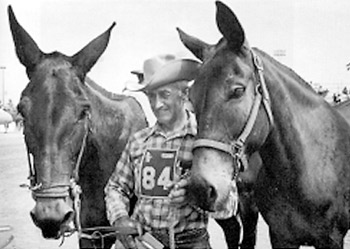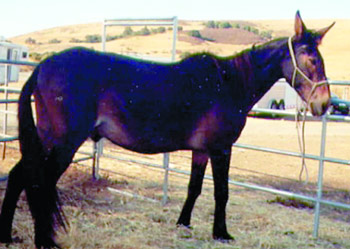|
April 20, 2006
Famed Lord Fauntleroy is put out to
pasture
By Jeanne Carbone Lewis
Staff Writer
When I first heard about Lord Fauntleroy I thought, that’s a pretty
fancy name for a mule. But Leroy (as most of his fan base called him) was a
pretty impressive mule. And many in the New Almaden area say his death last
month at 37-years-old marked the end of era.
 |
| With still a lot of race to go, (left) Leroy,
Virl Norton and Lady Eloise pose for a photo. Photos courtesy of Quicksilver
Endurance Riders |
So who was Lord Fauntleroy?
Maryben Stover,
president of the Quicksilver Endurance Riders, cared for Leroy the past 11
years of his life.
“Leroy was one of the real pioneers of modern
endurance riding,” said Stover. “He finished Tevis many times. In
1976, he won the Great American Horse Race from New York to Sacramento. In
those days, you trailered your horse to the starting point from California to
New York. The GAHR is the longest legitimate horse race ever.”
In
1974, Lord Fauntleroy finished in 58th place at Tevis. Since 1955, the Tevis
Cup Ride is the oldest modern day endurance ride. The goal of the trail ride is
to complete the 100-mile course from Tahoe to Auburn in 24 hours. In 1975,
Leroy took 40th place with a time of 19 hours and three minutes. He finished
the endurance race again in 1977 and in 1978.
Stover recently shared
the story of another run at Tevis that he would have finished if it wasn't for
his rider.
“They changed the course that year and Leroy did not
want to go what he knew was the wrong way after 80 miles,” said Stover.
“So being a mule and smarter than the rider he simply refused to go down
what he knew was the wrong trail. His rider had been bopping him with a crop
the whole way and refused to give it up when the crew told her to do so. She
finally gave up fighting him. He simply refused to budge. She would not go the
right way, and Leroy would not go the new way. I am told they rescued her the
next morning.”
Before Stover cared for Leroy, he was owned by
Virl Norton who was known as a cowboy’s cowboy. He lived in the New
Almaden area since the mid-l970’s caring and training his beloved horses,
mules and even zebras. Leroy was one of the equines. And at 16 hands high the
half thoroughbred donkey mix was big for a mule.
But probably
Leroy’s most crowning achievement was winning the 1976 Great American
Horse Race [GAHR] from New York to Sacramento. With no Federal Express or Jet
Pet, Leroy and Lady Eloise were transported by horse trailer with Norton and
his crew: 16-year-old son Pierce.
The GAHR is the longest legitimate
horse race. In 1976, there were 105 riders from 32 states and eight foreign
countries entering 14 different breeds of horses and eight mules. Only 53
finished the endurance race through the country’s mountains, plains and
deserts.
With Norton at the reins, the two mules traveled across
country, a 3,200-mile journey. Riders were allowed two mounts at the start of
the race. When the racers entered Red Cloud, Neb. only 58 riders and 80 horses
remained. Norton held the lead longer than any other rider with his two mules
and rode Leroy much of the time. They were first at Kankakee, Ill., Hannibal,
Mo. and Cheyenne, Colo. They were never lower than third place at any time
during the race after the second week.
Norton alternated mules until
Lady Eloise became lame at Winnemucca, Nev. Leroy was the mule who brought
Norton to the finish line of the Cal-Expo State Fair in Sacramento and won the
coveted first prize of $25,000. There was even a book written about the event,
"The Great American Horse Race of 1976." The GAHR broke the world record and
still is the longest legitimate horse race. And the record still stands
today.
 |
| Lord Fauntleroy relaxes in retirement at
Maryben Stover’s pasture. Circa 2003. |
Norton was known as “the Mule Man” at GAHR. He
expected to win and explained how he would.
“Watch the
mules,” said Norton in one of the many interviews during the cross country
GAHR. “They’re tougher and can take tough terrain and blacktop better
than a horse.”
Since the GAHR, Norton rode the Tevis eight times,
three times on a horse but five times on Leroy. When Norton died in 1995,
Stover promised her friend that Leroy would have a pasture for the rest of his
life. Leroy spent the last 11 years on Stover’s pasture surrounded by
other horses and a mule off McKean Road.
“We are only a mile away
or so from Virl’s old place so Leroy was very happy,” said Stover.
“I’d turn him loose in the yard and he’d run and buck and take
off to where he used to live. He was very smart. I sometimes have flights of
fancy that Virl knows that Leroy is happy and healthy.”
Sadly,
Leroy died in March. He was old, colicky, missing many teeth and at 37 not a
candidate for surgery. Stover says “his body just gave out.”
“When the vet came, Leroy knew he was there and with one last effort got
to his feet and walked out of the barn,” said Stover. “We laid him on
the grass in the yard. He just knew it was his time.”
|